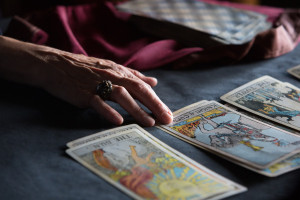
– By Cate Marquis –
Malick’s ‘Knight of Cups’ is beautiful but dull ramble through LA and Hollywood
Terrence Malick is a legendary director, known for beautiful, contemplative films. His “Tree of Life” portrayed the remembered experience of growing up, through the eyes of a child from infancy up, while the grown man contemplated the approaching death of his father. Despite its challenging experimental non-narrative approach, many audiences were captivated by its immersive, emotional experience and sheer visual beauty.
In “Knight of Cups,” Malick uses similar methods, with lush photography, whispered dialog that often expresses inner thoughts more than conversation, and a plot-less format. But even serious fans of Malick’s work may find “Knight of Cups” tough going, despite the gorgeous images and a cast that features Christian Bale and Cate Blanchett, among other stars.
“Knight of Cups” follows Rick (Christian Bale), a successful Hollywood scriptwriter, as he engages in love affairs, goes to lavish Hollywood parties, walks through empty studio back-lots, strolls through Los Angeles streets, and so forth. The title refers to a tarot card that features a handsome young knight, associated with romance and questing. Other characters are introduced with tarot cards – The Moon, The Hanged Man, Death – but the film tells us little upfront, and immerses us the Los Angeles world of Rick as he wanders around his world of Hollywood excess, pampered existence, shallowness and unreality, usually in the company of his latest love interest.

Credit: Melinda Sue Gordon / Broad Green Pictures
Apart from a tense relationship with his angry father (Brian Dennehy) and his explosive, ex-druggie brother (Wes Bentley), Rick seems to have few worries but has lost his focus in his comfortable, prosperous life. Women come and go – a starlet (Frieda Pinto), a married woman (Natalie Portman), and a stripper (Teresa Palmer), with a brief foray to Las Vegas – while his marriage to a doctor (Cate Blanchett) disintegrates. Occasionally there are confrontations with his brother or father. Most of Rick’s life is his endless romantic quest – we never see him work – as if being in love will fill all the voids.
On paper, the film might have sounded transcendent and ethereal, but disappointingly, it is not, even if it looks gorgeous. The film seems a condemnation of Hollywood emptiness but it is so slow, it is hard to stay focused on that. Bale plays Rick as an observer of his own life, narrating in voice-over. Among his lovers, the one person who has a meaningful life is the woman he discards, the wife played by Blanchett, a doctor tending to some of the homeless people we see in one street scene. Blanchett actually turns in the most affecting, emotional performance in this film, where all the other characters seem to be merely drifting through this beautiful landscape.
The film does offer an evocative view of Los Angeles, beginning with a little earthquake near the film’s start. Rick’s wandering takes him from Hollywood parties and studio back-lots, where sets recreate ancient Rome or Victorian London (depending on which way one faces), to streets filled with homeless people, run-down shops and moments of crime. Movie star beach houses and white neo-classical architecture contrast with the natural beauty of the seashore or stark desert landscapes.

Credit: Melinda Sue Gordon / Broad Green Pictures
The one constant, and joy, in this film is its cinematic beauty. Oscar-winning cinematographer Emmanuel Lubezki has shot some visually breathtaking films – “The Revenant,” “Birdman,” “Gravity,” and “Tree of Life.” Here his unerring camera captures the beauty of light, shadow and movement, whether he is filming a beach at sunset or a crowded, seedy L.A. street. Each scene is given a sense of dignity, gravitas and a feeling of continuing after the camera moves on.
If only the haunting beauty of Lubezki’s images were matched by the film. What Malick is saying seems to be a commentary on Hollywood life, whose vacuous nature has been noted many times before, even if it is true. Like with “To The Wonder,” Malick seems to be reaching for a transcendent feeling like “Tree of Life,” yet never quite makes it. Its striking photography is not enough to make up for the film’s emotionally-cool aimlessness.
© Cate Marquis / The Current
